In order to actively respond to the spirit of the National Education Conference and the National Science and Technology Conference, fully implement the deployment of Wuhan University’s 10th Party Congress, meticulously plan the development blueprint of the School, and wholeheartedly promote the School towards a new journey of high-quality development in the new era, on the afternoon of March 3rd, the School convened a seminar on the development strategy of the discipline of Information Resources Management. Senior professors of Humanities and Social Sciences Feicheng Ma and Chuanfu Chen, Gang Li, Director of Wuhan University Institute of Data Intelligence, SIM CPC Secretary Jun Tao, Dean Xiaoguang Wang, and other members of the School leadership team, heads of various academic directions, departments (offices, centers), and faculty party branch secretaries attended the meeting to jointly discuss the development of the School. Jun Tao presided over the meeting.
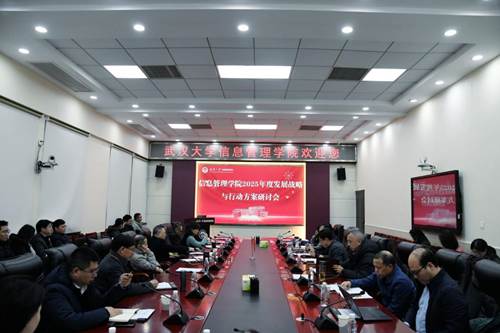
At the meeting, Xiaoguang Wang first conveyed the guiding principles from Wuhan University’s strategic development symposium and operational deployment conference. He emphasized that "deepening reforms" not only serves as the core theme for Wuhan University’s 2025 development agenda but also constitutes a critical driver for the school’s current advancement and discipline development. Wuhan University’s "two-step" strategic roadmap explicitly mandates that by 2029, several of its flagship disciplines must solidify their positions among the world’s top-tier academic fields. For the Information Resources Management discipline to maintain its leadership, it must consistently elevate political alignment, pinpoint priority tasks with precision, and act swiftly with a heightened sense of urgency and responsibility. This will ensure sustained growth in disciplinary competitiveness and global influence amid intensifying academic rivalry, thereby cementing its preeminent status.
To achieve this, the school must rigorously align with Wuhan University’s overarching strategy. In pivotal areas such as disciplinary transformation, talent cultivation model innovation, scientific innovation, and global collaboration, tailored and actionable measures shall be devised based on institutional realities. These efforts will focus on delivering a conclusive conclusion to the "14th Five-Year Plan" and the second phase of the "Double First-Class" initiative, while methodically advancing preparations for the "15th Five-Year Plan." Concurrently, the discipline must anchor itself to national strategic imperatives, drive breakthroughs in theoretical research and practical innovation, and pioneer synergistic mechanisms for nationwide discipline development. In the age of pervasive AI, it must fully leverage its unique intellectual strengths to address emerging challenges and demonstrate disciplinary relevance.
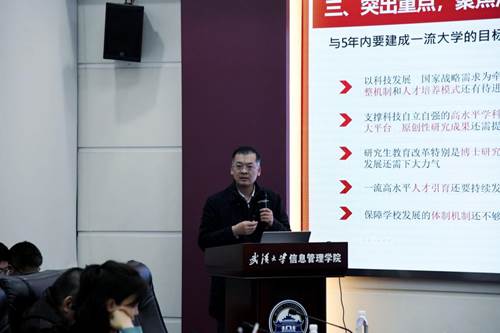
Following this, Associate Deans Jiang Wu, Lihong Zhou, and Ping Wang delivered detailed reports on the school’s key priorities: organized research, internationalization strategy, and digital-intelligent talent cultivation, respectively. They outlined current progress, analyzed existing challenges, and elaborated on future action plans.
Jiang Wu underscored that organized research is the cornerstone of the school’s advancement. He stressed the need to align research activities with national strategic priorities and disciplinary frontiers, coordinate closely with university-level departments and internal faculties/centers, clarify research objectives, and optimize team structures. Additionally, he advocated for establishing robust incentive mechanisms, operationalizing research platforms for efficient performance, and enhancing the quality and global impact of research outputs.
Lihong Zhou focused on the internationalization strategy, providing a critical assessment of current challenges and proposing targeted improvements. These include refining international collaboration frameworks, amplifying global visibility, building an international alumni database, and advancing fully English-taught programs and curricula.
Ping Wang addressed talent cultivation in the AI era, emphasizing the urgency of updating course systems, strengthening students’ AI literacy and innovation capabilities, accelerating the internationalization of undergraduate education, and rigorously improving doctoral education quality to secure a robust talent pipeline for the school’s long-term growth.
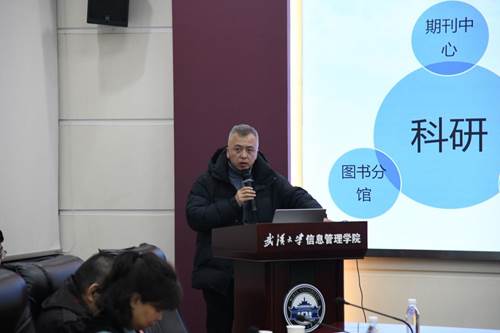
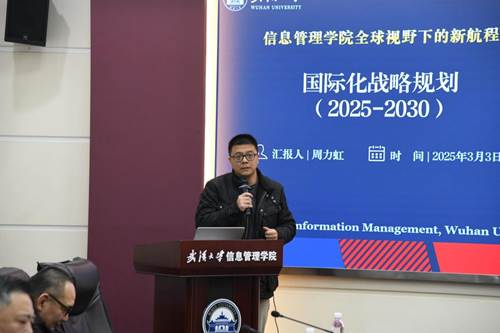
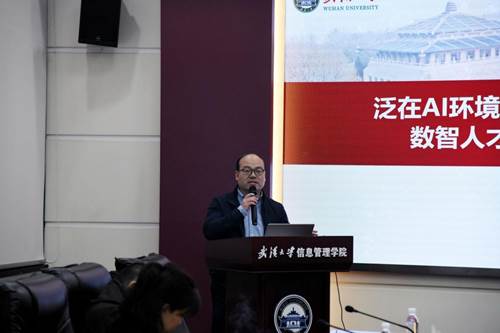
During the discussion session, Feicheng Ma and Chuanfu Chen delivered remarks successively. They highly commended the school’s swift and resolute implementation of Wuhan University’s key directives, affirming its stable developmental trajectory and steady progress in advancing the "two-step" strategic roadmap through methodical and impactful measures.
Feicheng Ma and Chuanfu Chen emphasized that, amid the current transformative landscape, discipline development must align closely with national strategies and actively serve state priorities. They advocated for adopting a new quality-centric philosophy to enhance the caliber of self-driven talent cultivation, thereby supplying the nation with more high-caliber professionals.
Additionally, they offered several actionable recommendations, such as expand internationalization: strengthen global engagement and collaboration to elevate the school’s worldwide profile; empower faculty potential: fully leverage individual academic strengths to energize the faculty and propel institutional growth; explore emerging fields: proactively develop digital-intelligent education and similar frontiers, refine disciplinary structures, and boost competitiveness to lay a robust foundation for the school’s next-phase breakthroughs.
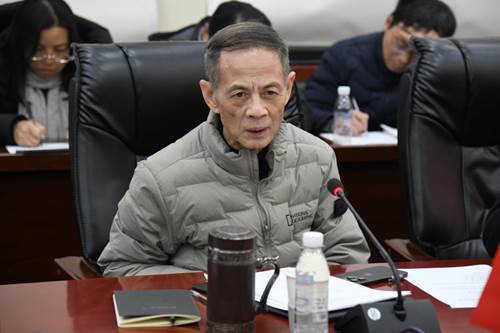
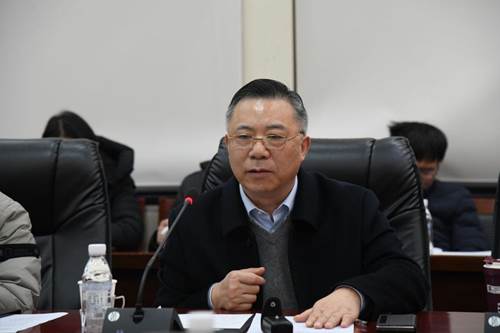
Participants engaged in discussions on critical issues, including the school’s development strategy, discipline advancement, talent cultivation, global collaboration, and research innovation, actively contributing insights and recommendations. A consensus emerged that the school must seize the historic opportunity of digital-intelligent transformation by optimizing disciplinary structures, enhancing team-building initiatives, and fostering cross-sector collaboration. Key proposals included: strengthen domestic and international partnerships to elevate global competitiveness and explore novel models for local government and corporate engagement; Dismantle disciplinary silos to enable collaborative synergy, energize faculty participation, and strategically allocate teaching resources to cultivate future-ready, high-caliber professionals.
In his concluding remarks, Xiaoguang Wang urged the school to unify its vision, anchor efforts to institutional goals, and rigorously implement Wuhan University’s strategic directives. He called for upholding the school’s ethos of “trailblazing creativity, pragmatic entrepreneurship, and innovation leadership” while fostering a heightened sense of responsibility and urgency to “pursue excellence and secure a leading position.”
Wang emphasized that reform-driven momentum is essential to revitalize institutional vitality and consolidate collective resolve. With a “second-phase entrepreneurship” mindset, the school must confront challenges posed by the era of pervasive AI through:
Accelerated modernization: Rapid iteration of practices and deepened interdisciplinary integration;
Targeted support systems: Categorized support mechanisms, streamlined institutional frameworks, and reinforced resource allocation;
Faculty-centric growth: Prioritizing faculty development and team empowerment to expedite global integration and spearhead digital-intelligent initiatives, thereby solidifying the school’s competitiveness in the new era.
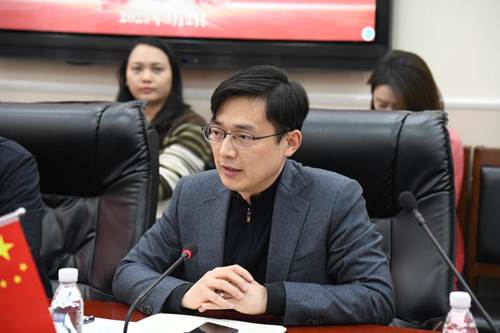
Jun Tao outlined overarching requirements for the school’s next-phase priorities. Firstly, cultivate a mindset of urgency. Given the intense competitive landscape and fleeting opportunities, swift action is imperative to ensure the effective implementation of all tasks. Secondly, embrace proactive accountability. The school must serve as the vanguard of the "Double First-Class" initiative, driving proactive contributions to discipline advancement and institutional excellence. Thirdly, foster a cohesive and collaborative culture. Unified commitment across all units is critical to consolidating efforts and maximizing institutional synergy. Fourthly, adopt a dual focus on integrity and innovation. Uphold the school’s foundational strengths in educational philosophy and pragmatic execution while boldly exploring novel models and pathways to pioneer new frontiers.